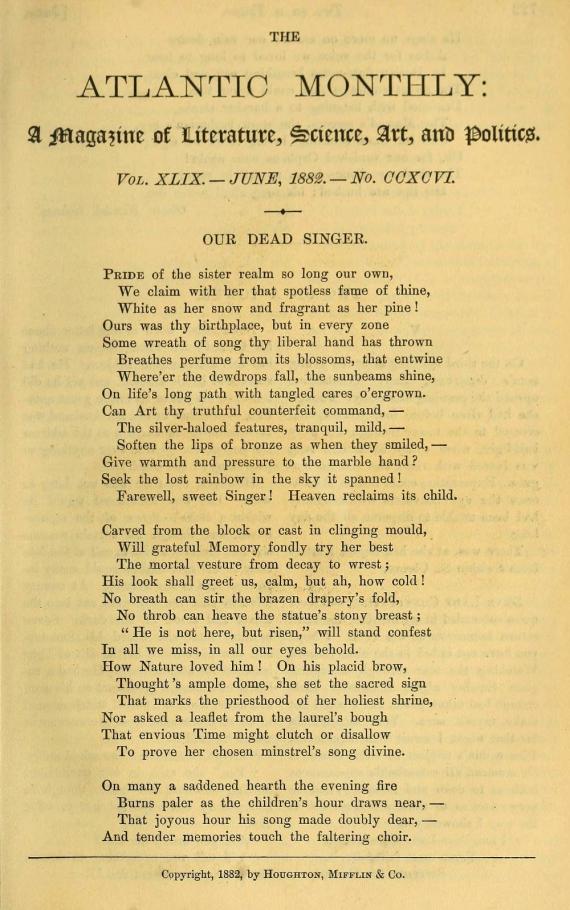OLIVER WENDELL HOLMES, “Our Dead Singer,” The Atlantic Monthly, June 1882
OLIVER WENDELL HOLMES, “Our Dead Singer,” The Atlantic Monthly, June 1882
Pride of the sister realm so long our own,
We claim with her that spotless fame of thine,
White as her snow and fragrant as her pine!
Ours was thy birthplace, but in every zone
Some wreath of song thy liberal hand has thrown
Breathes perfume from its blossoms, that entwine
Where’er the dewdrops fall, the sunbeams shine,
On life’s long path with tangled cares o’ergrown.
Can Art thy truthful counterfeit command,—
The silver-haloed features, tranquil, mild,—
Soften the lips of bronze as when they smiled,
Give warmth and pressure to the marble hand?
Seek the lost rainbow in the sky it spanned!
Farewell, sweet Singer! Heaven reclaims its child.
Carved from the block or cast in clinging mould,
Will grateful Memory fondly try her best
The mortal vesture from decay to wrest;
His look shall greet us, calm, but ah, how cold!
No breath can stir the brazen drapery’s fold,
No throb can heave the statue’s stony breast;
”He is not here, but risen,” will stand confest
In all we miss, in all our eyes behold.
How Nature loved him! On his placid brow,
Thought’s ample dome, she set the sacred sign
That marks the priesthood of her holiest shrine,
Nor asked a leaflet from the laurel’s bough
That envious Time might clutch or disallow,
To prove her chosen minstrel’s song divine.
On many a saddened hearth the evening fire
Burns paler as the children’s hour draws near,—
That joyous hour his song made doubly dear,—
And tender memories touch the faltering choir.
He sings no more on earth; our vain desire
Aches for the voice we loved so long to hear
In Dorian flute-notes breathing soft and clear,—
The sweet contralto that could never tire.
Deafened with listening to a harsher strain,
The Mænad’s scream, the stark barbarian’s cry,
Still for those soothing, loving tones we sigh;
Oh, for our vanished Orpheus once again!
The shadowy silence hears us call in vain!
His lips are hushed; his song shall never die.

